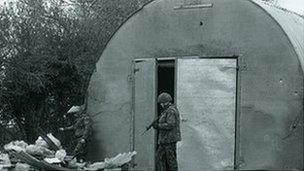McCaughey, Grew inquest 'justified killing' verdict to be challenged
- Published

The scene of the shooting in 1990
The family of one of two IRA men shot dead by the SAS has won permission to challenge an inquest verdict that the killings were justified.
A High Court judge granted leave to seek a judicial review on one complaint about the tribunal into the deaths of Martin McCaughey and Dessie Grew.
He ruled that an arguable case had been made that not enough was done to secure the re-attendance of a key witness.
Martin McCaughey's sister is seeking to have the inquest findings quashed.
Reasonable
The two men, armed with AK47 rifles, were shot more than 30 times when an SAS unit opened fire at farm buildings near Loughgall, County Armagh in October 1990.
Neither IRA man fired any shots, provoking claims that soldiers could have arrested them instead.
But in May a jury that heard the inquests found the killings were lawful.
It ruled that the SAS had used reasonable force during the operation and that the IRA men's own actions had contributed to their deaths.
Grew, 37, and McCaughey, 23, put their own lives in danger by being in the area close to a stolen car which was expected to be used in terrorist activity, according to the verdict.
Both men were said to be armed with guns, wearing gloves, balaclavas and were approaching soldiers who believed that their lives were in immediate danger.
The McCaughey family sought leave to judicially review verdicts reached by the jury on a number of grounds.
Their legal team argued that the inquest failed to comply with procedural protections guaranteed under European law, and failed to constitute an independent and effective investigation into the deaths.
Another key complaint centred on the failure to secure the re-attendance at the hearing of a military witness identified only as Soldier A.
Lethal
He was also linked to the use of lethal force in the SAS shooting of another IRA man Francis Bradley four years earlier.
Soldier A, who led the unit that shot Grew and McCaughey, initially gave evidence at the inquest.
However, he failed to return to the hearing after it was ruled he could be questioned about his involvement in the Bradley shooting and evidence appearing to show that all three IRA men had been shot while lying fatally wounded on the ground.
It was argued that the jury was denied access to material relevant to questions on whether the SAS were involved in as shoot-to-kill policy and whether the soldiers' use of lethal force was justified.
Mr Justice Weatherup ruled that the failure to get Soldier A back into the witness box was the only ground of challenge to pass the legal test at the preliminary stage of proceedings.
He said there was an arguable case that the coroner should have taken further steps, and that this required further examination.
All other grounds of challenge were dismissed.
The case is now expected to go to a full judicial review hearing later this year.
Following the verdict the McCaughey family's solicitor, Fearghal Shiels of Madden and Finucane, said: "We welcome the High Court decision to grant leave on this central issue.
"We will also be considering the merits of an appeal on the grounds on which leave has been refused."